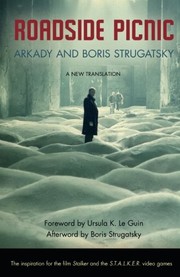admin reviewed Roadside Picnic by Аркадий Натанович Стругацкий (Best of Soviet Science Fiction)
Review of 'Roadside Picnic' on 'Goodreads'
5 stars
From the back:
"Red Schuhart is a stalker, one of those young rebels who are compelled, in spite of extreme danger, to venture illegally into the Zone to collect the mysterious artifacts that the alien visitors left scattered around. His life is dominated by the place and the thriving black market in the alien products. But when he and his friend Kirill go into the Zone together to pick up a "full empty," something goes wrong. And the news he gets from his girlfriend upon his return makes it inevitable that he'll keep going back to the Zone, again and again, until he finds the answer to all his problems.
First published in 1972, Roadside Picnic is still widely regarded as one of the greatest science fiction novels, despite the fact that it has been out of print in the United States for almost thirty years. This authoritative new translation corrects many errors and omissions and has been supplemented with a foreword by Ursula K. Le Guin and a new afterword by Boris Strugatsky explaining the strange history of the novel's publication in Russia."
First sentence: "I suppose that your first important discovery, Dr. Pillman, was the celebrated Pillman radiant?"
Last sentence: "To hell with it all, I just can't think of a thing other than those words of his-HAPPINESS, FREE, FOR EVERYONE, AND LET NO ONE BE FORGOTTEN!"
Recently, I've been reading more science fiction. I don't know how accurate that statement is because, really, I've just been reading a lot of Ursula K. Le Guin and John Wyndham. Both authors approach science fiction in a way that appeals more to me. They focus less on the flashy technology and the science but more on the daily and surprisingly human interactions between foreign entities. Discovering new cultures or experiencing what-if scenarios of how humans would react to certain events is what I look for in science fiction.
For some reason, I was a little dubious about Roadside Picnic. A friend of mine recommended this to me and it seemed like we were on the same page when it came to science fiction. I was a little worried when I learned that one of their favourite games, S.T.A.L.K.E.R. was based on this book. I'm not someone really interested in shooters or high-risk treasure hunts. I decided to give it a shot anyway. When I saw that Le Guin had written the foreword to Roadside Picnic, I was delighted. If my friend with good taste and my favourite science fiction author approved of it, it must be good, right?
I was not disappointed.
First, let me gush about Le Guin's foreword for a second. Le Guin mentions the context that this novel was written in. Censorship was rampant during this time in the Soviet Union. In the afterword, Boris Strugatsky recounts many of the violations Roadside Picnic managed to accumulate, ranging from acts of violence, crude language, and immoral behaviour. Le Guin so succinctly observes that science fiction (in Russia) is a way to write from freedom from Party ideology. More concisely, "They wrote as free men write."
The universe of Roadside Picnic is soaked with subtle details of the daily lives of stalkers and the collateral damage they leave behind. The concept of the novel is somewhat simple: aliens visited Earth and humans go into those locations to grab whatever the aliens left behind for research, profit, or both. However, it takes that and creates compelling stories from it.
While Roadside Picnic explores narratives from several characters, the character in the spotlight the most is Rederick Schuhart or as he is more known by, Red. By far, he is the most interesting character out of all them. When the point of view shifted to other characters, I was a bit bored (bar the one philosophical conversation that I found extremely intriguing). However, the Strugatsky brothers accomplished something in that although I was bored, the content was still important in contributing to the story.
This book, overall, was just a lot of fun. It is a quick read and although it took me a week to get through it, I found myself flipping pages frantically. I did not want to put it down (it doesn't help that when I read, I usually read on the commute and I can't stay on a train forever).
An interesting thing that I really liked about this novel was just how Russian it is. When I think dystopian, I think of We by Yevgeny Zamyatin. I remember reading a review of Roadside Picnic that compares the two. They are entirely but they both are extremely Russian. I don't know what it is, but Russian authors have such a distinct voice that I am completely enamoured with. From Nabokav to Bulgakov to Dostoyevsky... I think I can now add the Strugatsky brothers to my list of Russian authors that I admire.

